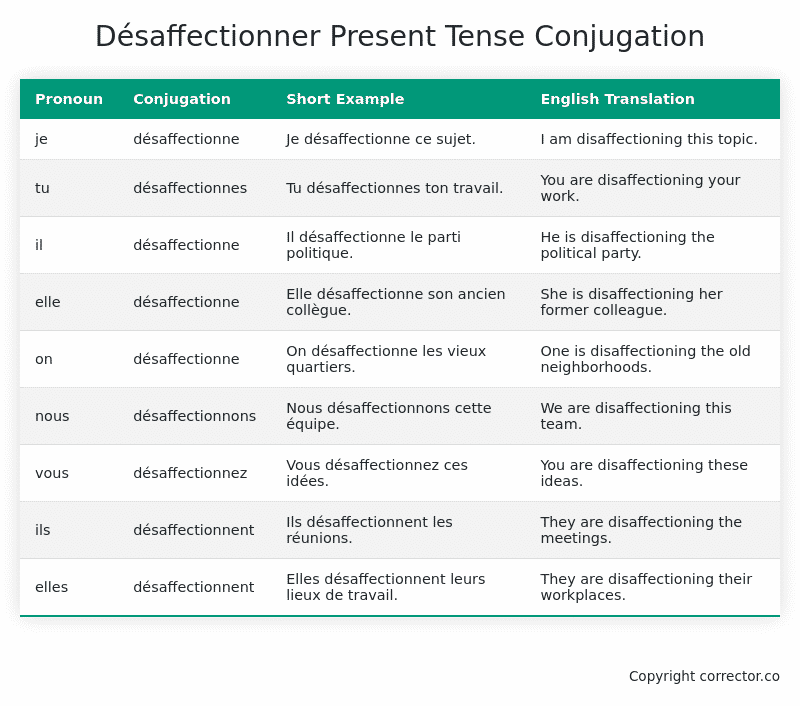Le Present (Present Tense) Conjugation of the French Verb désaffectionner
Introduction to the verb désaffectionner
The English translation of the French verb désaffectionner is “to alienate” or “to disenchant”. The pronunciation of the infinitive form désaffectionner is “day-zah-fek-see-oh-neh”.
Désaffectionner is derived from the French noun “affection” which means “attachment” or “affection”. The prefix “dés-” indicates negation or reversal, making désaffectionner mean “to remove attachment” or “to disaffect”.
In everyday French, désaffectionner is often used to describe the action of causing someone to lose interest, loyalty, or affection towards someone or something. It implies a gradual process of alienation or disenchantment.
Examples of usage:
-
Elle a été désaffectionnée par son entreprise après de nombreuses années de loyauté.
(She was alienated by her company after many years of loyalty.) -
Le film a désaffectionné les spectateurs avec son scénario décevant.
(The movie alienated the viewers with its disappointing plot.) -
Les promesses non tenues ont désaffectionné les électeurs envers le candidat.
(Unfulfilled promises disenchant the voters with the candidate.)
Note: The examples provided are not intended to be conversational, but rather to illustrate the usage of the verb in different contexts.
Désaffectionner – About the French Present Tense
To take a deep dive into all the French tenses then see our article on Mastering French Tense Conjugation.
Common Everyday Usage Patterns For Le Present
Interactions with Other Tenses
Table of the Present Tense Conjugation of désaffectionner
| Pronoun | Conjugation | Short Example | English Translation |
|---|---|---|---|
| je | désaffectionne | Je désaffectionne ce sujet. | I am disaffectioning this topic. |
| tu | désaffectionnes | Tu désaffectionnes ton travail. | You are disaffectioning your work. |
| il | désaffectionne | Il désaffectionne le parti politique. | He is disaffectioning the political party. |
| elle | désaffectionne | Elle désaffectionne son ancien collègue. | She is disaffectioning her former colleague. |
| on | désaffectionne | On désaffectionne les vieux quartiers. | One is disaffectioning the old neighborhoods. |
| nous | désaffectionnons | Nous désaffectionnons cette équipe. | We are disaffectioning this team. |
| vous | désaffectionnez | Vous désaffectionnez ces idées. | You are disaffectioning these ideas. |
| ils | désaffectionnent | Ils désaffectionnent les réunions. | They are disaffectioning the meetings. |
| elles | désaffectionnent | Elles désaffectionnent leurs lieux de travail. | They are disaffectioning their workplaces. |
Other Conjugations for Désaffectionner.
Le Present (Present Tense) Conjugation of the French Verb désaffectionner (You’re reading it right now!)
Imparfait (Imperfect) Tense Conjugation of the French Verb désaffectionner
Passé Simple (Simple Past) Tense Conjugation of the French Verb désaffectionner
Passé Composé (Present Perfect) Tense Conjugation of the French Verb désaffectionner
Futur Simple (Simple Future) Tense Conjugation of the French Verb désaffectionner
Futur Proche (Near Future) Tense Conjugation of the French Verb désaffectionner
Plus-que-parfait (Pluperfect) Tense Conjugation of the French Verb désaffectionner
Passé Antérieur (Past Anterior) Tense Conjugation of the French Verb désaffectionner
Futur Antérieur (Future Anterior) Tense Conjugation of the French Verb désaffectionner
Subjonctif Présent (Subjunctive Present) Tense Conjugation of the French Verb désaffectionner
Subjonctif Passé (Subjunctive Past) Tense Conjugation of the French Verb désaffectionner
Subjonctif Imparfait (Subjunctive Imperfect) Tense Conjugation of the French Verb désaffectionner
Conditionnel Présent (Conditional Present) Tense Conjugation of the French Verb désaffectionner
Conditionnel Passé (Conditional Past) Tense Conjugation of the French Verb désaffectionner
Conditionnel Passé II (Conditional Past II) Tense Conjugation of the French Verb désaffectionner
L’impératif Présent (Imperative Present) Tense Conjugation of the French Verb désaffectionner
L’impératif Passé (Imperative Past) Tense Conjugation of the French Verb désaffectionner
L’infinitif Présent (Infinitive Present) Tense Conjugation of the French Verb désaffectionner
L’infinitif Passé (Infinitive Past) Tense Conjugation of the French Verb désaffectionner
Le Participe Présent (Present Participle) Tense Conjugation of the French Verb désaffectionner
Le Participe Passé (Past Participle) Tense Conjugation of the French Verb désaffectionner
Struggling with French verbs or the language in general? Why not use our free French Grammar Checker – no registration required!
Get a FREE Download Study Sheet of this Conjugation 🔥
Simply right click the image below, click “save image” and get your free reference for the désaffectionner present tense conjugation!

I hope you enjoyed this article on the verb désaffectionner. Still in a learning mood? Check out another TOTALLY random French verb present conjugation!


